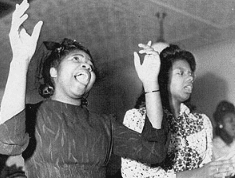Gospel was originated in the late 1800s by African-American churches in the southern United States. The reason why gospel remains deeply rooted in the rich traditions of the African American church is because this genre is soulful. African-American spirituals and hymns are often times accompanied by hand-clapping and foot-stomping. The characteristics of this genre are set up in a call-and-response form by the use of a choir. Gospel plays a significant social role due to its connection to religion. Within gospel music there is ties to our beliefs, values, and behaviors. This results in a new shared culture that impacts people to trust in the power of religion. In the late 1930s Thomas A. Dorsey (in Chicago Illinois) changed the way gospel hit the ears. Also known as the “Father of Gospel” Dorsey created a new style of gospel music called gospel blues, eventually gospel blues was introduced as the new form of traditional gospel.

Important performers of gospel music include Thomas A. Dorsey, Kirk Franklin, and Hezekiah Walker. Each artist has their own style of gospel and eventually branched off into new created future genres of gospel. The future genres that gospel has inspired are christian hip-hop, which tailors to the younger generation of gospel listeners. Praise and worship music, which requires more instrumentation than regular gospel. Also, Urban contemporary gospel, a modern form of Christian music. Key instruments include a drum set, choir (usually distinguished by robes), an organ, and keyboard. Gospel music is composed and performed for many purposes, including aesthetic pleasure, religious or ceremonial purposes, and as an entertainment product for a plethora of audiences. Gospel usually has dominant vocals in each soprano, alto, and tenor levels of voices in lyrics of gospel.
The gospel Examples of gospel music are linked below;

